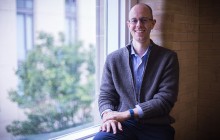What do taxes have to do with fighting poverty and increasing equality around the globe? We meet Wilson Prichard, a professor of international development who was recently awarded tenure, and whose work helps taxpayers get the most out of their contribution to government. Prichard shares his thoughts on the value of work that has purpose, and the importance of being grateful and committed to change.
Describe your big “a-ha” moment.
As an undergraduate student, I was involved with an advocacy group that sought to raise awareness of the international HIV/AIDS crisis. HIV/AIDS was spreading rapidly all over the world with high rates of infection, but the global response was next to nothing and I tried to draw attention to this issue. It was a big “a-ha” moment for me, because I realized there are enormous problems in the world, and in principle, we know how to solve them, but there’s little political commitment to actually doing it. How do you mobilize popular and political support for change? A few years later, when George W. Bush announced that the United States was going to launch the President’s Emergency Plan for AIDS Relief in 2004, I had a second “a-ha” moment: If you push hard enough, sometimes you make progress. These were formative moments in shaping how I think about my work, and they influence me to this very day.
What’s a global issue that you’re passionate about and why?
I’ve always been concerned with the profound inequalities that exist in the world, within and across countries. Most of my work for the past 15 years or so has been focused on international development, particularly in sub-Saharan Africa. I came to it from the somewhat naive perspective of wanting to do something good and worthwhile in the world. Over time I gained a more critical view of my role, but I continue to work in partnership with local policymakers, in order to create new opportunities and better outcomes.
Increasingly, my focus has shifted and became broader – I look at issues that affect more countries, but also global challenges that affect us all, wealthy and low-income countries alike. That’s what led me to pay closer attention to taxation. It sounds like a very mundane and technocratic topic, but when you think about it, it is one of the foundations of citizenship. I pay something to my government, and it gives me something in return. It’s a useful way to think about the relationship of accountability between citizens and governments, and it became a core aspect of my work. Addressing domestic and international tax rules is a way to build greater equality, and I hope my research allows us to have broader discussions on these issues that can engage a wider audience and generate political interest for change. That’s when an idea can have a tangible impact.
Who has influenced you most in life and why?
The obvious answer would be my parents. They gave me every opportunity in life; they’re principled people who wanted to do work that had meaning. I grew up knowing that you could be motivated by the values of the hard work you’re doing.
A second important influence is Dan Offord, a child psychiatrist from McMaster University who started a camp near Ottawa called Christie Lake Kids for economically disadvantaged children and youth who face behavioural challenges or struggle in school. I worked there for three consecutive summers, from age 17 to 19, and it was a very powerful experience in connecting with people outside high school. It was the first time I had the feeling I made a difference, and I found happiness in doing that kind of work. I learned tremendously about myself, others and the world.
I am indebted to my PhD supervisor, Mick Moore, one of the few people who was focusing on taxation as a major development issue, and a person committed to fostering innovative academic work while looking at ways to translate that into real action, engaging with research partners all over the world and citizens at a local level. I found that commitment to a broader vision of academia’s purpose very inspiring. He also went out of his way to open doors for me, and I’m trying to similarly provide opportunities to other people who are motivated to do important work.
Lastly, my partner. She’s a good reminder to be happy and kind while doing the work, and not just become so embroiled that you forget those other things that are essential in life.
What impact do you want to make on the world or your local community?
I hope that my work contributes, in some sense, to making the world a bit fairer, healthier, and more sustainable, in whatever ways I can. I see my work as trying to give a voice to those who tend to be marginalized or excluded. My work on taxes in developing countries is fundamentally about how to support taxpayers so they get a better deal for the money they pay to their governments. I try to do similar things through teaching, and encourage my students to reflect on why they’re doing the work that they’re doing, why it is meaningful, and how they can make a positive contribution while maintaining a happy and balanced life.
What is your personal philosophy?
Try to do work that has some value. Try to be kind while doing it. Try to be happy, yourself, at the same time. And be grateful.
October 31, 2016
